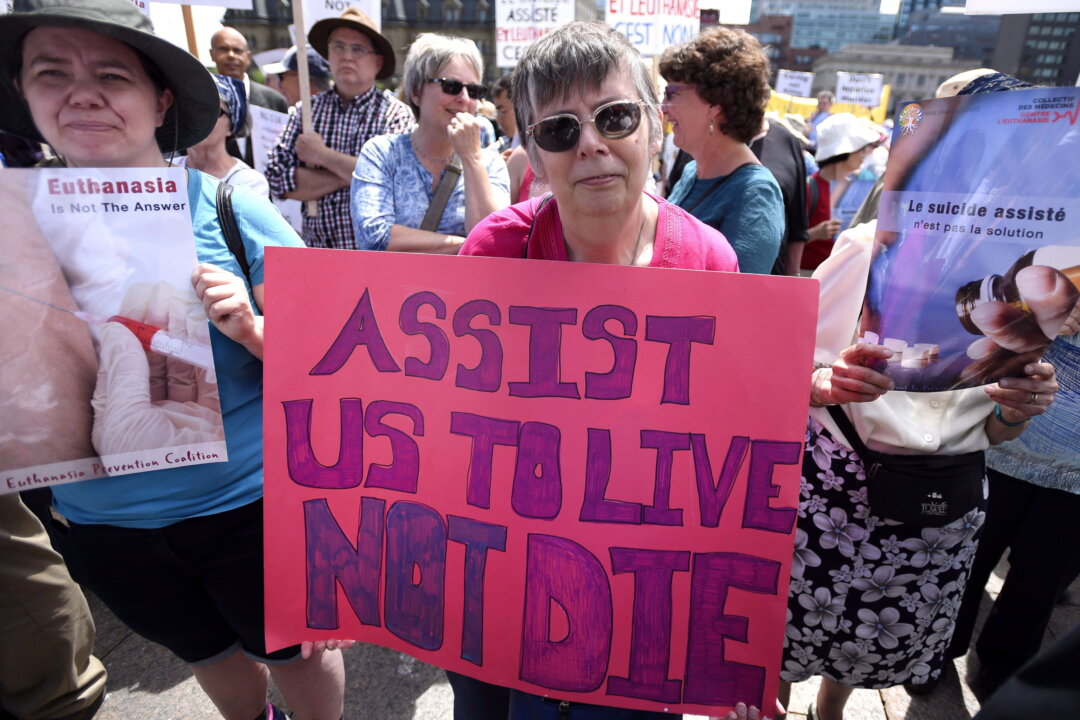Lifestyle
Advocates Rally for Bill to Ban Euthanasia for Mental Illness

On October 28, advocates opposing euthanasia gathered for a news conference in support of a private member’s bill aimed at prohibiting medical assistance in dying (MAID) for individuals suffering solely from mental illness. The event was organized by the Euthanasia Prevention Coalition (EPC), which endorsed Conservative Member of Parliament Tamara Jansen’s Bill C-218. This legislation was introduced in June and is currently undergoing its second reading in the House of Commons.
The proposed bill seeks to restrict the scope of MAID, ensuring it does not extend to individuals diagnosed solely with mental health conditions. During the news conference, Gordon Friesen, president of the EPC, articulated the coalition’s position, emphasizing that support for MAID is rooted in the belief that patients should have the ability to make “free, informed, competent and adult choices.”
Bill C-218: A Closer Look
If passed, Bill C-218 would specifically prevent the expansion of MAID to those whose only affliction is a mental illness. Proponents argue that individuals experiencing mental health challenges may not be in a position to make such irreversible decisions. The EPC contends that mental illness can impair judgment and distort perceptions of suffering, which could lead to decisions that may not align with the individual’s true wishes.
The discussion surrounding MAID has intensified in recent years, particularly after the Canadian government expanded eligibility criteria in March 2021. These changes allowed individuals with a wider range of health conditions, including certain mental illnesses, to qualify for assistance in dying. Critics, including members of the EPC, argue that this expansion poses ethical dilemmas and risks for vulnerable populations.
Friesen highlighted the importance of protecting those who may not fully understand the implications of choosing MAID. He stated, “We must consider the long-term effects of allowing euthanasia as an option for those struggling with mental health.” The coalition aims to ensure that individuals facing such challenges receive adequate support rather than being offered an end-of-life option.
Public and Political Response
The introduction of Bill C-218 has sparked a mixed response from the public and political spheres. Supporters of the bill advocate for a careful examination of the ethical consequences of MAID, especially concerning mental health. They argue that societal pressures and stigma surrounding mental illness could lead individuals to perceive euthanasia as a viable solution to their suffering.
Opponents of the bill, however, argue that access to MAID can provide a sense of autonomy and control for individuals facing unbearable psychological distress. They believe that adequate safeguards can be put in place to ensure that only those who are truly capable of making informed decisions can access MAID.
As the debate continues, the fate of Bill C-218 remains uncertain. The bill’s second reading in the House of Commons will be a crucial step in determining whether it can advance through the legislative process. The EPC and other advocacy groups plan to remain engaged, sharing their perspectives and influencing the discourse on this complex issue.
The outcome of this legislative effort could have significant implications for the future of mental health care and euthanasia policies in Canada. Advocates are urging lawmakers to consider the broader societal implications of allowing MAID for individuals suffering from mental illness and the potential risks involved.
-

 Education3 months ago
Education3 months agoBrandon University’s Failed $5 Million Project Sparks Oversight Review
-

 Science4 months ago
Science4 months agoMicrosoft Confirms U.S. Law Overrules Canadian Data Sovereignty
-

 Lifestyle3 months ago
Lifestyle3 months agoWinnipeg Celebrates Culinary Creativity During Le Burger Week 2025
-

 Health4 months ago
Health4 months agoMontreal’s Groupe Marcelle Leads Canadian Cosmetic Industry Growth
-

 Science4 months ago
Science4 months agoTech Innovator Amandipp Singh Transforms Hiring for Disabled
-

 Technology4 months ago
Technology4 months agoDragon Ball: Sparking! Zero Launching on Switch and Switch 2 This November
-

 Education4 months ago
Education4 months agoRed River College Launches New Programs to Address Industry Needs
-

 Technology4 months ago
Technology4 months agoGoogle Pixel 10 Pro Fold Specs Unveiled Ahead of Launch
-

 Business3 months ago
Business3 months agoRocket Lab Reports Strong Q2 2025 Revenue Growth and Future Plans
-

 Technology2 months ago
Technology2 months agoDiscord Faces Serious Security Breach Affecting Millions
-

 Education4 months ago
Education4 months agoAlberta Teachers’ Strike: Potential Impacts on Students and Families
-

 Education4 months ago
Education4 months agoNew SĆIȺNEW̱ SṮEȽIṮḴEȽ Elementary Opens in Langford for 2025/2026 Year
-

 Science4 months ago
Science4 months agoChina’s Wukong Spacesuit Sets New Standard for AI in Space
-

 Business4 months ago
Business4 months agoBNA Brewing to Open New Bowling Alley in Downtown Penticton
-

 Business4 months ago
Business4 months agoNew Estimates Reveal ChatGPT-5 Energy Use Could Soar
-

 Technology4 months ago
Technology4 months agoWorld of Warcraft Players Buzz Over 19-Quest Bee Challenge
-

 Business4 months ago
Business4 months agoDawson City Residents Rally Around Buy Canadian Movement
-

 Technology4 months ago
Technology4 months agoFuture Entertainment Launches DDoD with Gameplay Trailer Showcase
-

 Technology2 months ago
Technology2 months agoHuawei MatePad 12X Redefines Tablet Experience for Professionals
-

 Top Stories3 months ago
Top Stories3 months agoBlue Jays Shift José Berríos to Bullpen Ahead of Playoffs
-

 Technology4 months ago
Technology4 months agoGlobal Launch of Ragnarok M: Classic Set for September 3, 2025
-

 Technology4 months ago
Technology4 months agoInnovative 140W GaN Travel Adapter Combines Power and Convenience
-

 Science4 months ago
Science4 months agoXi Labs Innovates with New AI Operating System Set for 2025 Launch
-

 Technology4 months ago
Technology4 months agoNew IDR01 Smart Ring Offers Advanced Sports Tracking for $169










